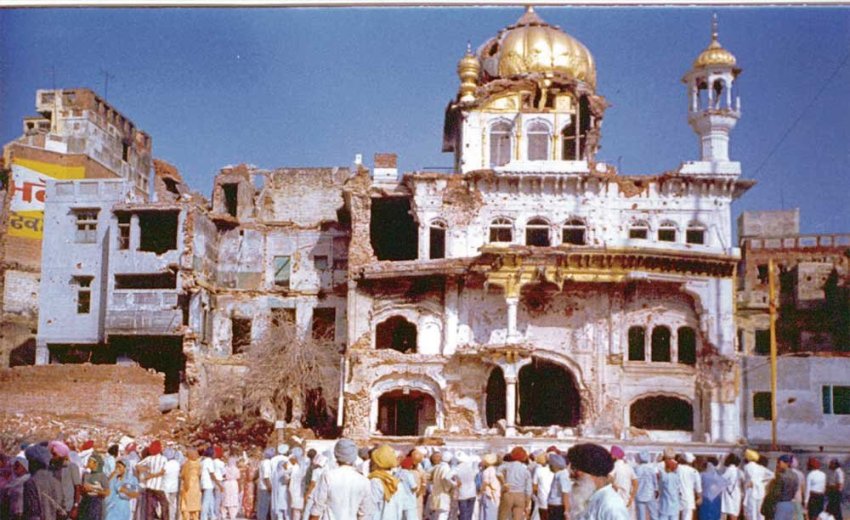 LOS ANGELES: Will Sikhs help fund a veteran filmmaker's efforts to tell his personal story of the 1984 massacres of Sikhs, in a documentary film? Amazed that the most traumatic event in recent Sikh history is quickly fading from Sikh cultural memory, Michael Singh has set out to correct that in a rather unconventional fashion: essentially asking Sikhs in the Diaspora one question: How serious are you about preserving Sikh culture? His intent is to make a one-hour documentary based on materials he himself recorded and filmed during three days in Delhi while mobs roamed outside the compound where he and his brother Surinder were staying.
LOS ANGELES: Will Sikhs help fund a veteran filmmaker's efforts to tell his personal story of the 1984 massacres of Sikhs, in a documentary film? Amazed that the most traumatic event in recent Sikh history is quickly fading from Sikh cultural memory, Michael Singh has set out to correct that in a rather unconventional fashion: essentially asking Sikhs in the Diaspora one question: How serious are you about preserving Sikh culture? His intent is to make a one-hour documentary based on materials he himself recorded and filmed during three days in Delhi while mobs roamed outside the compound where he and his brother Surinder were staying.
With an American mother of German and Dutch heritage, and a father born a Sikh in a Punjabi village, the two young men hid their ethnic identities during that terrible time, and learned first hand of the bravery of those who could not hide.
"Documentary films don't turn a profit, generally speaking," says Michael, in explaining why so little has been done regarding Sikhs either in India or worldwide. "Investors find little incentive to pay a quarter million dollars, or even several million dollars, for a one hour film, unless it is a personal passion to bring a story to television or the theaters." Michael's story begins when he and his brother return home to India, where they'd grown up.
They managed to infiltrate Sri Harminder Sahib two weeks after Indira Gandhi's Operation Blue Star had laid most of it to ruin. And five months later, the brothers found themselves staying at One Church Lane, guests of the Bishop of Delhi, while mobs roamed outside, killing any Sikh in sight. For three days, some thirty women and children from the neighboring Rakab Ganj gurudwara sought refuge in the Bishop's compound despite threats from the killers.
The experience had a profound effect on Michael, who also filmed and interviewed survivors at both Harminder Sahib and in Delhi. Upon returning to the United States, he publicized his story, and to his delight, three Sikh film producers showed up at his Silver Lake, Los Angeles, apartment, expressing their desire to hear his interviews and bankroll his film.
A most encouraged Michael served them chai and samosas and agreed to meet in a more formal setting for a contractual agreement. Only after the three Sardars left did Michael realize they had stolen his taped interviews. "I don't know who they were. Perhaps they were Government agents. Whoever they were, I'd definitely like them to return my tapes, no questions asked," says Michael. That loss disheartened him enough to shelve the project for decades, until he began to notice how few records actually exist of 1984.
 And that many Sikh youth have no knowledge of this incredibly tragic event and the lack of justice that haunts its victims and their families.He resolved to finish his project. "It takes about 5,000 man hours," he explained, "to make a one-hour film. If you see the credits at the end of a film, you know of the dozens if not hundreds of people involved. And they all get paid." Hence Michael's campaign that essentially challenges Sikhs to support his cause. "Our budget is very tight, very modest, for a documentary film," he says.
And that many Sikh youth have no knowledge of this incredibly tragic event and the lack of justice that haunts its victims and their families.He resolved to finish his project. "It takes about 5,000 man hours," he explained, "to make a one-hour film. If you see the credits at the end of a film, you know of the dozens if not hundreds of people involved. And they all get paid." Hence Michael's campaign that essentially challenges Sikhs to support his cause. "Our budget is very tight, very modest, for a documentary film," he says.
"The bottom line is, to hire a team of professionals and work for four to six months, plus expenses, will require about $250,000." Is he deluded in thinking that Sikhs will change their ways, and actually donate to such a cause? "I like to think positively," says Michael. "I believe there are enough concerned Sikhs worldwide, who will give a hundred dollars here, a thousand there." And what about a broadcast in India?
"Well, I don't depict Mrs Gandhi in the most flattering light," admits Michael. "I see her as having mounted the tiger of political ambition and power at all cost. And in the end, she slipped off and the tiger ate her. Hence the title." Will he tell us what he means by ambition and power at all cost? "Her tragic flaw was listening to her son, Sanjay," says Michael, not mincing words. "She tossed out the constitution, forcibly sterilized men and women, blasted her way through the Sikhs' holiest of holies, and she caused thousands of innocent people to be slaughtered. All in the name of preserving her power. And she paid the price.
I was witness to some of this, and believe it should not be forgotten. I can't think of a better medium for telling this story, than a documentary film." Let's see if Michael's vision will find others willing to offer their support. To watch Michael's trailer, please visit ridingthetiger.tv
